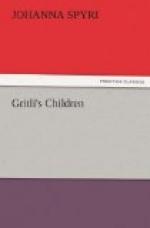The doctor came towards noon, and declared that a complete change of air would be the best thing for the little Nora, who certainly seemed to be losing strength daily. He would write to a physician, a friend of his in Switzerland, to find a suitable place for her, and would come again as soon as he received an answer.
Towards evening, Nora sat once more in the window, gazing wearily at the long slanting rays of the setting sun that fell across the greensward in golden radiance, and lighted up the rose-leaves till they shone like lamps among the flowers. Clarissa sat at her work-table by Nora’s side and from time to time, she raised her head and looked sadly at the frail form that lay so motionless in the window-seat.
“Clarissa,” said the child, presently, “will you repeat the old song of Paradise to me?”
Clarissa laid aside her work.
“We will sing it together again some day, dear child, when you are strong enough; now I will say it to you if you wish” and she folded her hands and began:—
“A stream of water,
crystal bright,
Flows down through
meadows green,
Where lilies, shining in the
light,
Like twinkling
starlets gleam.
“And roses blow, and
roses glow,
While birds in
every tree
Are singing loud, are singing
low,
‘In Paradise
are we.’
“Here, gently blows
the soft, sweet wind;
Bright flowers
grow all around;
Men wake, as from a dream,
to find
They tread on
holy ground.
“In blissful happiness
they rove,
At peace with
each and all;
United now in bonds of love,
Freed from the
grave’s dark pall.
“All want and weariness
are o’er,
All sorrow and
all pain;
Their rapture gathers more
and more;
The sick are well
again.”
After Clarissa had finished her recitation, no sound broke the stillness for a long time; Nora seemed lost in thought. “Clarissa,” she said at last, “that is a beautiful poem, and makes me long to go.”
“Yes; go willingly, go gladly, dear child,” replied Clarissa, with tears in her eyes. “Then you can wander joyfully among the bright flowers, and sing:
“’Our rapture
gathers more and more;
The sick are well
again.’
“And we shall soon join you there, your mamma and I—”
At this moment the mother entered, and Clarissa stopped suddenly; for she knew well that Mrs. Stanhope could not endure the thought of losing little Nora, even though her child were called to heaven; but the mother had heard enough of what had been said, and looked at the child with renewed anxiety. Nora certainly looked very pale and weary; and, at her mother’s request, she let herself be carried at once to bed in Clarissa’s strong and tender arms.
Later in the evening when Mrs. Stanhope sat alone with her old friend, she began anxiously to question the suitableness of talking to the child upon such topics.




